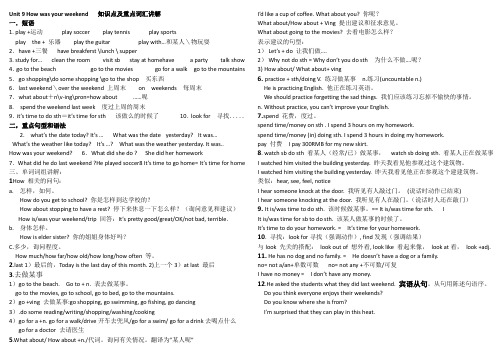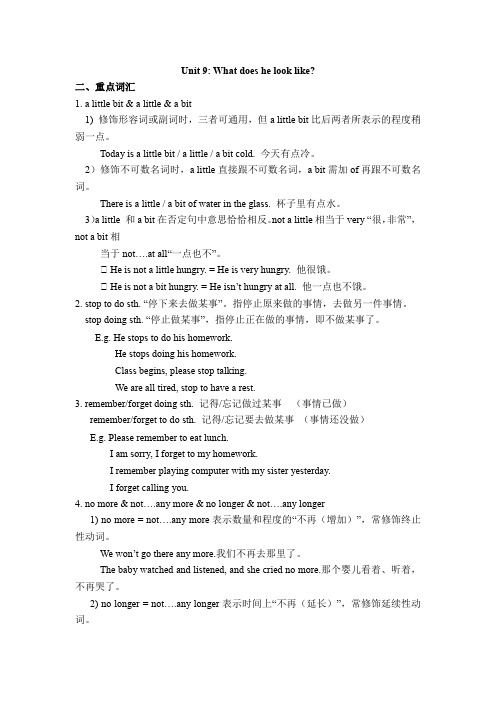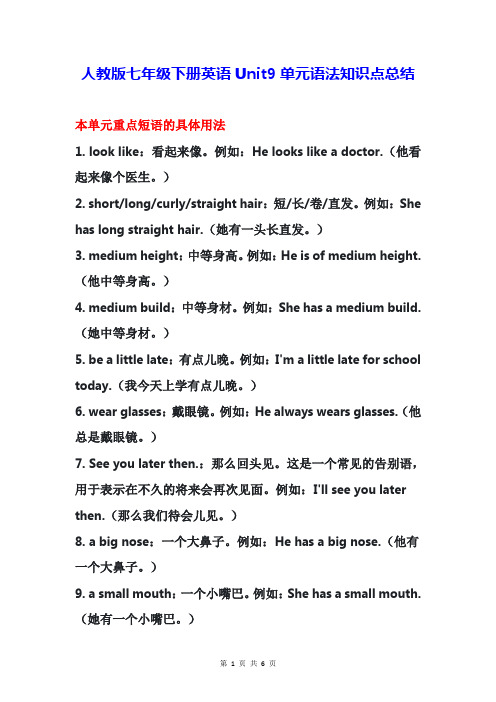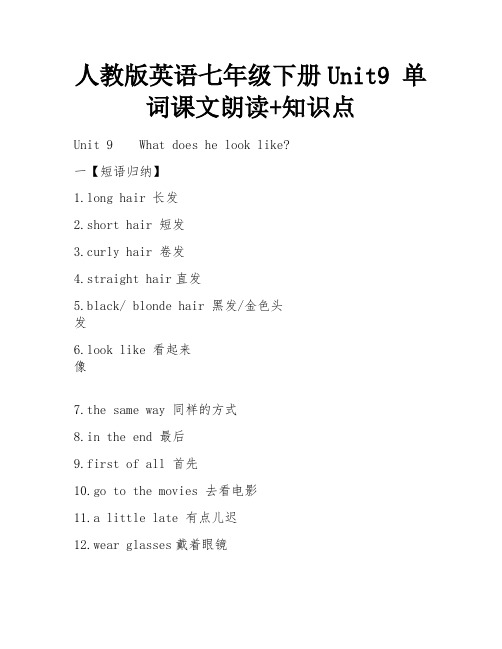人教版七年级下册第九单元unit9重点短语语法句型
人教版七年级下册unit9+10核心考点归纳(语法+词汇+短语+重点句子)

人教版七年级下册unit9+10核心考点及语法归纳【unit 9语法】一、一般疑问句的结构(1)基本的结构为:be/助动词/情态动词+主语+谓语/表语+(其他),句子要读升调,如:Are they your friends?Does he go to school on foot?Will you be free tonight?Can you play basketball?(2)一般疑问句的答语及特殊情况(may, must, could)一般疑问句需用“yes/no”来回答(3)一般疑问句和选择疑问句的区别选择疑问句不能用“yes/no”回答例如:--Is this your pen or hers?这是你的钢笔还是她的?--It’s mine.是我的二、特殊疑问句概述特殊疑问句(special questions),也可称为“wh”-questions,因为它们多数都以who,where,when,which,whose,why这类词开头,如:Who is it on the phone?How many oranges can you see in the picture?Where did you last see it?What did you eat yesterday?How do you usually go to school?Why didn’t you tell me?它的结构一般为:特殊疑问词+一般疑问句,即:特殊疑问词+be/助动词/情态动词+主语+谓语/表语+(其他),如:who,whom,which,what,whose五个疑问代词when,where,why,how及how与其他副词和形容词组成的疑问副词what time, how long, how soon, how often, how old, how far, how many, how much【unit 9重点句子】He has brown hair and wears glasses.他留着棕色头发,戴着眼镜。
人教版七年级下册第九单元unit9重点短语语法句型

(3) They will visit our hometown next week.
(4) We have a visit toShanghai.
总结: visit (1)动词:拜访、参观; (2)名词:访问、浏览
visitor名词参观者、访问者
词条
含义
用法
范围
other
别的;其他的
后接复数名词
表示范围不确定或泛指
the other
别的,其他的
(两部分中的另外一部分)
后接单数或复数,具体看情况。常用语one…the other…结构
表示两者中的另一个
another
另一个,又一个
后常接单数名词或不可数名词
常用语三者或三者以上
三、重点句型:Biblioteka 1.一般过去时:(2) The girl dances very well.那个女孩跳舞跳得很好。
d. well用作名词,意为“井、水井”。
例: (1) He is pumping water from the well.他正在从井里抽水。
2. visit判断visit的词性:
(1) He often visits his friends.
行为动词无单复数: Did+人+V原+其它?
5. “花费”总结
单词
用法及区别
pay…for
Sb. pay +钱+ for +物
Spend...on
Spend…in doing sth
Sb. spend +钱+ on +物
人教版丨七年级下册英语9单元知识点总结

人教版丨七年级下册英语9单元知识点总结Unit 9单词(音标)curly ['kɜː(r)li] adj. 卷曲的straight [streɪt] adj.直的tall [tɔːl] adj. 高的medium ['miːdɪəm] adj.中等的height [haɪt] n.身高;高度(be) of medium height中等身高thin [θɪn] adj.瘦的heavy ['hevi] adj. 重的build [bɪld] v.身材(be) of medium build 中等身材tonight [tə'naɪt] adv.&n.(在)今晚;(在)今夜little ['lɪtl] adj. 小的a little一点儿,少量cinema ['sɪnɪmə] n.电影院glasses ['glɑ:sɪz](pl.)n. [轻] 眼镜later ['leɪtə(r)] adv.以后handsome ['hænsəm] adj.英俊的actor ['æktə(r)] n.演员actress ['æktrəs] n. 女演员person ['pɜː(r)sn] n. 人nose [nəʊz] n. 鼻子blonde [blɒnd] adj.(头发)金黄色的mouth [maʊθ] n.嘴round [raʊnd] adj. 圆形的face [feɪs] n. 脸eye [aɪ] n. 眼睛singer ['sɪŋə(r)] n. 歌手artist ['ɑː(r)tɪst] n. 艺术家crime [kraɪm] n.犯罪活动criminal ['krɪmɪnl] n. 罪犯put [pʊt] v. 放each [iːtʃ] adj. &pron. 每个;各自way [weɪ] n.方式;路线describe [dɪ'skraɪb] v.描述differently ['dɪfərəntli] adv. 不同地another [ə'nʌðə(r)] adj.&pron. 另一;又一end [end] n. 结尾;尽头in the end最后real [rɪəl] adj.真正的;真实的jeans [dʒi:nz] n. 牛仔裤Johnny ['dʒɒni]约翰尼(男名)Dean [di:n]迪安(姓)Tina ['ti:nə]蒂娜(女名)Jackson ['dʒæksən] 杰克逊(姓)Unit9 知识梳理【重点短语】1. look like 看起来像2. short/long/curly/straighthair短/长/卷/直发2. medium height 中等身高3. medium build 中等身材4. be a little late 有点儿晚5. wear glasses 戴眼镜6. See you later then. 那么回头见。
人教版英语七年级下册第九单元短语语法知识点总结

Unit 9What does he look like?【短语归纳】1、short hair 短发2、long hair 长发3、curly hair 卷发4、straight hair 直发5、(be) of medium height 中等个子6、(be) of medium build 中等身材7、go to the movies 去瞧电影8、a little 有点儿9、look like 瞧起来像10、a big nose 大鼻子11、trfa small mouth 小嘴巴12、a round face 圆脸13、black hair 黑发14、big eyes 大眼睛15、a long face 长脸16、the same way 同样的方式17、in the end 最后18、blonde hair 金黄色的头发【用法集萃】1、What does / do + 主语+ look like? ……瞧上去什么样?2、sb、+ be + of + medium build / height 某人中等身材/ 个子3、sb、+ has +… hair 某人留着……发┃语法探究┃Ⅰ、形容词的排列顺序在英语中,当名词有多个形容词修饰时,就有它们的先后顺序。
下面的口诀可帮您记住这一先后顺序: 限定描绘大、长、高,形状、年龄与新老;颜色、国籍跟材料,作用、类别往后靠。
注解1: “限定词”包括: 冠词、物主代词、指示代词与数词,它位于各类形容词前。
它本身分为三位,即: 前、中、后。
前位限定词有all、half、both、分数与倍数;中位限定词有冠词、指示代词、物主代词等;后位限定词有基数词与序数词,但序数词位于基数词前。
如: both my hands; all his income、注解2: “描绘”性形容词。
如: beautiful、bad、cold、great等。
注解3: “大、长、高”表示大小、长短、高低等一些词;表示“形状”的词。
人教版七年级下册英语Unit9 重点句型解析

人教版七年级下册英语Unit9 重点句型解析1. Then Joe draws a picture of the criminal, and the police put it in newspaper and on television to find him.本句中的put是及物动词,意为“把……放在;摆,搁,安置”,常用于以下结构;(1)put + 名词/代词+介词短语例如:Please put the book on the desk. 请把书放在桌子上。
(2)put + 名词/代词+副词(短语)例如:Put the chair here, please. 请把那张椅子放在这里。
拓展:put的相关短语put on 穿上(衣服)put away 放好,把……收起来put up 举起,张贴,搭建put down 放下,写下2. He is of medium height.He is of medium height/build.= He has a medium height/build.两句意思一样,但侧重点不同“be + of + 名词”结构,表示人或事物的特点,性质,相当于“be + 表示人物或者事物的特点、性质的形容词”。
例如:It is of great importance for us = It is important for us.对于我们来说它很重要。
He has a medium build/height.表示他有中等身材或身高,侧重于现状。
3. Are you going to the movie tonight?这是个现在进行时表示将来意义的句子。
现在进行时可以表示将要发生的,计划或安排好的事情,这时使用的动词常为趋向性动词和表示位置转移的动词,如:come, go, arrive, leave, start, return等。
另外,用现在进行时表示将来的句子里常有一个表示将来时间的状语,如:tonight, this afternoon, this evening, tomorrow等。
人教版七年级英语下册第九单元知识点归纳

⼈教版七年级英语下册第九单元知识点归纳⼈教版七年级英语下册第九单元知识点归纳Unit 9 What does he look like?◆短语归纳1. short hair 短发2. long hair 长发3. curly hair 卷发4. straight hair 直发5. (be) of medium height 中等个⼦6. (be) of medium build 中等⾝材7. go to the movies 去看电影8. a little有点⼉9. look like 看起来像10. a big nose ⼤⿐⼦11. a small mouth ⼩嘴巴12. a round face 圆脸13. black hair ⿊发14. big eyes ⼤眼睛15. a long face 长脸16. the same way 同样的⽅式17. in the end 最后18. blonde hair ⾦黄⾊的头发19 a little bit =a little=kind of ⼀点⼉… 20. a pop singer ⼀位流⾏歌⼿21. have a new look 呈现新⾯貌21. go shopping (do some shopping) 去购物21. the captain of the basketball team 篮球队队长22.one of ------中的⼀个23. be popular with sb 受某⼈欢迎24. stop to do sth 停下来去做某事25. stop doing sth 停⽌正在做的事情26. tell jokes/ stories 讲笑话/ 讲故事27. have fun doing sth 愉快地做某事28. remember ( forget) to do sth 记得(忘记)做某事(没有做的)29. remember (forget) doing sth 记得(忘记)做过某事(已做)30.be +⾼矮胖瘦31.what do/does look like?=what +be +sb.+like?询问某⼈的外貌◆⽤法集萃1. What does / do + 主语+ look like? ……长得什么样?2. sb. + be + of + medium build / height 某⼈中等⾝材/个⼦3. sb. + has +… hair 某⼈留着……发4. sb. wears + clothes/glasses 某⼈穿着/戴着……◆典句必背1. —What does he look like? 他长什么样—He’s really tall. 他真的很⾼。
人教版 七年级 下册 unit 9 第九单元知识点 Unit 9 What does he look like

Unit 9 What does he look like?一、语法(询问人的外貌)1、询问长相:What do/does sb. look like/be like?(看起来像,指外关上的像)2、描述长相:(1)主语+is/are+介词短语例:She is of medium build.She is a girl with short hair.(2)主语+is/are+形容词(短语)例:She is thin。
(3)主语+have/has(a/an)+adj.+n. 例:She has long hair.(4)主语+wear(s)+服饰例:She wears a red dress.3、形容词的用法:县(限)官(观)行(形)令(龄)谢(色)国财限定词(冠词、指代、形代、名词所有格、数词)+表示观点的词(fine/beautiful/interesting)+代表大小、长短、高低、形状+年龄、新旧+颜色、国籍、地区+物质材料二、知识点1、Short hair短发(1)short形容词,“矮的(tall);短的(long)”(2)hair 名词,“头发”,不可数;可数名词,表示具体数量的头发。
2、tall高的(1)tall常指人、动、树、建筑物的等高,反义词为short.(2)High多指山高;抽象意义上的高(价格高)3、medium height中等身高(1)medium形容词,“中等的,中型的”(2)height为形容词high的名词形式,“身高,高度”,不可数名词;询问某人的身高或某物的高度是多少,常用what。
例:What’s your height?4、What does he look like?(1)look like看起来像,常指人的外观或外貌(2)be like常指人的性格、人品例:What is she like?5、She is of medium height,and she has long straight hair.(1)用来描述外貌的常用句型。
七年级下册英语第九单元知识点(人教版)

Unit 9 How was your weekend?一、词组1.do one’s homework=do homework 做某人的家庭作业(do my homework 做我的家庭作业)2.play +运动或棋类(如:play soccer 踢足球play chess 下棋)3.play +the+乐器(如:play the guitar 弹吉他)4.clean my room 打扫我的房间5.go to the beach 去海滩6.go to the movies 去看电影7. on Saturday morning周六上午(in the morning/afternoon/evening 在早上/在下午/在晚上)[介词(prep): ① on + 具体的星期几/ 日期Eg: on Sundays/ July 7② in + 月/年/季节/世纪Eg; in July/ 2006/ summer/ 21century③ at + 具体钟点Eg; at 7:00]8. visit sb 拜访某人(visit my friend 看望我的朋友)9. study for the (math) test 准备(数学)考试10. do some reading 阅读(do+some+ving表示动作)[do some washing洗衣服do some cooking做饭do some shopping购物]11. stay at home 呆在家里12. have a party 举行一个晚会13. practice English 练习英语[practice (practiced) doing sth 练习做某事(类似用法:like, enjoy, have fun)]14.study geography 学习地理15. go shopping 去购物(go+v.ing 表示“去做某事”)[go swimming去游泳go boating去划船go climbing 去爬山]16. play computer games 玩电脑游戏17. go to summer camp 去夏令营18. go to the mountains 去爬山19. go for a walk 散步20.read a book about history 读一本历史书21.see an interesting talk show 看一个有趣的访谈节目22.write a new song 写一首新歌23. spend the weekend 度假[spend (spent) sometime / money (in) doing sth花费时间/金钱做某事spend (spent) sometime / money on sth 在某事上花费时间/金钱做某事]24. look for 寻找(的动作)find (found) 寻找(的结果)[Eg: I looked for everywhere but I couldn’t find my key.我找了所有的地方,都没有找到我的钥匙。
人教版 七年级英语下 Unit 9 知识点及重点词汇讲解

Unit 9 How was your weekend 知识点及重点词汇讲解一.短语1. play +运动play soccer play tennis play sportsplay the + 乐器play the guitar play with…和某人\物玩耍2.have +三餐have breakferst \lunch \ supper3. study for…clean the room visit sb stay at homehave a party talk show 4.go to the beach go to the movies go for a walk go to the mountains 5.go shopping\do some shopping \go to the shop 买东西6.last weekend\over the weekend 上周末on weekends 每周末7.what about+n\v-ing\pron=how about ……呢8. spend the weekend last week 度过上周的周末9.it’s time to do sth=it’s time for sth 该做么的时候了10.look for寻找.....二,重点句型和语法2.what’s the date today? It’s …What was the date yesterday?It was…What’s the weather like today? It’s …? What was the weather yesterday. It was..How was your weekend? 6.What did she do ?She did her homework7.What did he do last weekend ?He played soccer8 It’s time to go home= It’s time for home 三、单词词组讲解:1How 相关的问句:a.怎样,如何。
人教版七年级英语下册第九单元知识点讲解

Unit 9: What does he look like?二、重点词汇1. a little bit & a little & a bit1) 修饰形容词或副词时,三者可通用,但a little bit比后两者所表示的程度稍弱一点。
Today is a little bit / a little / a bit cold. 今天有点冷。
2)修饰不可数名词时,a little直接跟不可数名词,a bit需加of再跟不可数名词。
There is a little / a bit of water in the glass. 杯子里有点水。
3)a little 和a bit在否定句中意思恰恰相反。
not a little相当于very “很,非常”,not a bit相当于not….at all“一点也不”。
① He is not a little hungry. = He is very hungry. 他很饿。
② He is not a bit hungry. = He is n’t hungry at all. 他一点也不饿。
2. stop to do sth. “停下来去做某事”。
指停止原来做的事情,去做另一件事情。
stop doing sth. “停止做某事”,指停止正在做的事情,即不做某事了。
E.g. He stops to do his homework.He stops doing his homework.Class begins, please stop talking.We are all tired, stop to have a rest.3. remember/forget doing sth. 记得/忘记做过某事(事情已做)remember/forget to do sth. 记得/忘记要去做某事(事情还没做)E.g. Please remember to eat lunch.I am sorry,I forget to my homework.I remember playing computer with my sister yesterday.I forget calling you.4. no more& not….any more&no longer& not….any longer1) no more = not….any more表示数量和程度的“不再(增加)”,常修饰终止性动词。
Unit9重点句型及重点句子++2023-2024学年人教版英语七年级下册+

人教版七年级下unit9重点句型及重点句子1.What does he look like?他长什么样2.He has short curly blonde hair.他留金黄色卷曲的短发。
3.He has long straight brown hair.他留棕色直的长发。
4.He isn’t thin or heavy.他不胖也不瘦5.He is of medium build.他是中等身材6.He isn’t tall or short.他不高也不矮7.He is of medium height.他中等身高8.Is that your friend? Yes, it is. No, it isn’t.那是你的朋友吗?9.He wears glasses.他戴眼镜。
10.H e wears jeans.他穿牛仔裤。
11.H e has a round face.他有一个圆脸12.H e has a small mouth.他有一个小嘴13.H e has a big nose.他有一个大鼻子14.H e is tall with long hair.他是高个子留长发的。
15.A re you going to the movie tonight?你今晚打算去看电影吗?16.I may be a little late.我可能会有点晚17.I s he tall or short? 他是高的还是矮的18.D o they have straight or curly hair?他们留直发还是卷曲头发?19.my favorite singer我最喜欢的歌手20.a n interesting job一个有趣的工作21.a very interesting job一份非常有趣的工作22.a police artist一个警察画师23.a n artist一个艺术家24.T hey tell him what the criminal looks like.他们告诉他罪犯长什么样。
人教版英语七年级下册Unit9【重点短语+词法语法句法精讲】

【课堂笔记】人教版英语七年级下册Unit9一、重点短语二、重点句型1.—What do you look like?你长得怎么样?—I'm short and thin.我又矮又瘦。
2.—What do they look like?他们长得怎么样?—They're of medium height.他们中等身高。
3.—What does he look like?他长得怎么样?—He is of medium build.他中等身材。
4.He has a big nose/mouth.他有一个大鼻子/大嘴巴。
5.—Do they have straight or curly hair?他们是直发还是卷发?—They have curly hair.他们是卷发。
6.—Is he tall or short?他是高的还是矮的?—He isn't tall or short. He's of medium height.他不高也不矮。
他中等身高。
7.He has straight yellow hair.他有着黄色的直发。
.The ha ndsome singer has two big eyes.那个帅气的歌手有一双大眼睛。
9.I may be a little late.我或许要晚一会儿。
10.They tell him what the criminal looks like.他们告诉他罪犯长什么样子。
三、词法精选1.tall与 high的用法high 和 tall 都有“高”的意思。
tall 指身材的高度,一般用于人和动物,它的反义词是short。
high 一般表示物体的高度,它的反义词是low。
如:Tom is tall. He can climb the high mountain.汤姆是高个子,他能爬那座高山。
2.wear glasses 戴眼镜wear是“穿着;戴着”的意思,强调状态。
人教版七年级下册英语Unit9单元语法知识点总结

人教版七年级下册英语Unit9单元语法知识点总结本单元重点短语的具体用法1. look like:看起来像。
例如:He looks like a doctor.(他看起来像个医生。
)2. short/long/curly/straight hair:短/长/卷/直发。
例如:She has long straight hair.(她有一头长直发。
)3. medium height:中等身高。
例如:He is of medium height.(他中等身高。
)4. medium build:中等身材。
例如:She has a medium build.(她中等身材。
)5. be a little late:有点儿晚。
例如:I'm a little late for school today.(我今天上学有点儿晚。
)6. wear glasses:戴眼镜。
例如:He always wears glasses.(他总是戴眼镜。
)7. See you later then.:那么回头见。
这是一个常见的告别语,用于表示在不久的将来会再次见面。
例如:I'll see you later then.(那么我们待会儿见。
)8. a big nose:一个大鼻子。
例如:He has a big nose.(他有一个大鼻子。
)9. a small mouth:一个小嘴巴。
例如:She has a small mouth.(她有一个小嘴巴。
)10. big eyes:大眼睛。
例如:She has big eyes.(她有一双大眼睛。
)11. blonde hair:金黄色的头发。
例如:Her blonde hair shines in the sun.(她的金黄色头发在阳光下闪耀。
)12. a long face:一个长脸。
例如:He has a long face.(他有一个长脸。
)13. have an interesting job:有一份有趣的工作。
人教版英语七年级下册Unit9 单词课文朗读+知识点

人教版英语七年级下册Unit9 单词课文朗读+知识点Unit 9 What does he look like?一【短语归纳】1.long hair 长发2.short hair 短发3.curly hair 卷发4.straight hair直发5.black/ blonde hair 黑发/金色头发6.look like 看起来像7.the same way 同样的方式8.in the end 最后9.first of all 首先10.go to the movies 去看电影11.a little late 有点儿迟12.wear glasses戴着眼镜13.draw a picture of sb.为某人画幅画14.be good at 擅长15.on television 在电视上16.in newspapers 在报纸上17.remember well 记得牢靠18.describe differently描述不同19.an interesting job一份有趣的工作20.a small mouth 小嘴巴21.a big nose 大鼻子22.a long face 长脸23.a round face 圆脸24.big eyes 大眼睛25.your favorite actor/actress你最喜欢的演员/女演员26.a picture of the criminal罪犯的一幅图片;27.a police artist警察局的拼图师二【用法】1. What does / do + 主语+ look like? ……看上去什么样?2. sb. + be of medium build / height 某人中等身材 /身高3. sb. + has +… hair某人留着……发长/短+卷/直+颜色+头发have short curly blonde hair 留着短短的金色卷发4. each + 可数名词单数每个…5. another + 可数名词单数再一、又一、另一……6. tell sb to do sth 告诉某人做某事tell sb not to do sth. 告诉某人不要做某事三【典句必背】1. —What does he look like? 他长什么样—He’s really tall. 他真的很高。
人教版七年级下册英语Unit 9 知识点语法归纳总结

Unit 9 What dose he look like?1.短语归纳2.典句必背3.用法集萃(1)What does he look like? 他长什么样?❖“What+do/ does+主语+look like?” 句型用于询问人的外貌特征。
回答时常用描述外貌的形容词,可用“主语+be动词+形容词”句式,也可用“主语+have/ has+形容词+名词”句式进行描述。
例:—What does your brother look like? 你哥哥长什么样?—He is tall and thin./He has short curly hair.他又高又瘦/他有一头短短的卷发❖在英语中,询问性格通常用“What+be动词+主语+like?”的句式。
例:—What is your new teacher like? 你的新老师是什么样的人?—She is very strict. 她很严厉牛刀小试—What does your math teacher _______ ?—He is of medium height and young.A.look atB.look afterC.look forD.look like(2)Are you going to the movie tonight? 你今天晚上去看电影吗?❖本句是“be going to+地点或场所” 的句式结构,表示“打算/将要去某地或某场所”例:We are going to Hong Kong next month. 我们下个月打算去香港Are you going to Lisa's birthday party? 你打算去参加莉萨的生日聚会吗?❖拓展:be going to do sth.是一般将来时的结构,表示“计划/打算做某事”。
例:They are going to travel around Europe. 他们打算环游欧洲(3)Yeah, but I may be a little late.对,但是我可能会晚到一点①本句中的may是情态动词,意为“可能;或许”,表示推测。
人教版英语七年级下册第九单元短语语法知识点总结说课讲解

Unit 9What does he look like?【短语归纳】1. short hair 短发2. long hair 长发3. curly hair 卷发4. straight hair 直发5. (be) of medium height 中等个子6. (be) of medium build 中等身材7. go to the movies 去看电影8. a little 有点儿9. look like 看起来像10. a big nose 大鼻子11. a small mouth 小嘴巴12. a round face 圆脸13. black hair 黑发14. big eyes 大眼睛15. a long face 长脸16. the same way 同样的方式17. in the end 最后18. blonde hair 金黄色的头发【用法集萃】1. What does / do + 主语+ look like? ……看上去什么样?2. sb. + be + of + medium build / height 某人中等身材/ 个子3. sb. + has +… hair 某人留着……发┃语法探究┃Ⅰ.形容词的排列顺序在英语中,当名词有多个形容词修饰时,就有它们的先后顺序。
下面的口诀可帮你记住这一先后顺序:限定描绘大、长、高,形状、年龄和新老;颜色、国籍跟材料,作用、类别往后靠。
注解1: “限定词”包括:冠词、物主代词、指示代词和数词,它位于各类形容词前。
它本身分为三位,即:前、中、后。
前位限定词有all、half、both、分数和倍数;中位限定词有冠词、指示代词、物主代词等;后位限定词有基数词和序数词,但序数词位于基数词前。
如:both my hands; all his income.注解2: “描绘”性形容词。
如:beautiful、bad、cold、great等。
- 1、下载文档前请自行甄别文档内容的完整性,平台不提供额外的编辑、内容补充、找答案等附加服务。
- 2、"仅部分预览"的文档,不可在线预览部分如存在完整性等问题,可反馈申请退款(可完整预览的文档不适用该条件!)。
- 3、如文档侵犯您的权益,请联系客服反馈,我们会尽快为您处理(人工客服工作时间:9:00-18:30)。
词条
含义及用法
each
“每;各自”强调个体,后接单数可数名词或可以接of短语,each of作主语,谓语用单数。
every
“每个的”强调整体,后接单数可数名词,后不能接of短语
Eg: Each child has a pen.每个孩子都有一支笔。
Every student is here.每位学生都在这里。
一、重点词汇:
1. well
a. well感叹词,意为“喂、好吧、哎、噢“等,表示惊讶、同意、让步”,常用在句
子开头,用逗号隔开。
例: (1) Well, let’s go to play basketball.好吧,让我们一起去打篮球吧。
(2) Well, I remember writing to her a letter.噢,我记得给她写了一封信。
Be动词类(状态)He/she/it(单)+was
You/they/we(复)+were
人+V-过去式+其它.
行为动词类(动作)They liked game.
They came here.
一般疑问句的基本结构:
be动词前置于句首:He was a student.Was he a student?
6. watch
watch out密切注视,当心,提防
watch one's step走路小心,谨慎
watch over看守,监视
a. Watch sb. do sth.看到某人做某事(事已做完)。
例: (1) I watched him open the door.
b. Watch sb doing sth.看到某人正在做某事(事正在进行)。
(2)I watched him opening the door.
7.maybe和may be的区别:
词条
词性
含义
位置
may be
“情态动词+原形”
也许是,可能是
句中
maybe
副词
也许,可能,大概
一般句首
翻译:他或许在操场。(用may be和maybe各造一句)
He may be at the playground.=Maybe he is at the playground.
词条
含义
用法
范围
other
别的;其他的
后接复数名词
表示范围不确定或泛指
the other
别的,其他的
(两部分中的另外一部分)
后接单数或复数,具体看情况。常用语one…the other…结构
表示两者中的另一个
another
另一个,又一个
后常接单数名词或不可数名词
常用语三者或三者以上
三、重点句型:
1.一般过去时:
b. stay vt.阻止、防止例: We mush stay the disease(疾病).
c. stay n.停留、做客例: He wants to make a short stay inShanghai.
stay at someplace停留在某地
stay up熬夜
stay down蹲低
4. practise
2. It’s time to go home.
a.It is time to do sth.该做某事了。
例: (1)It is time to do homework.It is time to go to bed.
b.It is time for +n.(名词)该做某事了。例:It is time for lunch.
主+was/were + not…
主(单/复)+did not+V原.
c.(1)时间状语的变化:
现在时
过去时
Now现在
Then那时
Today今天
That day那天
Tomorrow明天
The next day第二天
Tomorrow morning
明天早晨
The next morning
第二天早晨
Last night昨天晚上
a. practice n.练习不可数名词
例: Let’s have a practice game.
b. practice v.练习后接名词、代词、动名词
例: (1) We often practice English in groups.
(2) They are practice playing basketball now.
(2) The girl dances very well.那个女孩跳舞跳得很好。
d. well用作名词,意为“井、水井”。
例: (1) He is pumping water from the well.他正在从井里抽水。
2. visit判断visit的词性:
(1) He often visits his friends.
He lived in here before 1999.
他1999年以前住在这里。
(3)in/on/at表示时间的区别:
天
半天天
d.动词过去式构成规则:
规则
例子
1.一般情况,在动词后直接加ed
want—wanted;look—looked
2.以不发音的“e”结尾的动词,直接加d
like—liked;live—lived
练习:Each girl in the class_____singing.(like)
_____ of the students wears school uniform(校服).
_____girl in class likes singing.
9.other,the other与another的区别:
Theylikedgame.Theydid not likegame
Helikedgame.Hedid not likegame.
一般现在时PK一般过去时:
陈述句
主+am/is/are+…It’s here.
主(单)+V-s.He likes it.
主(复)+V原.They like it.
主+was/were+… It was here.
b. well用作形容词,意为“身体健康的、康复的”。
例: (1) Take the medicine three times a day, then you will be well soon.
一天吃三次药,不久你就恢复健康了。
c. well副词,修饰实义动词,意为“好”。
例: (1) He draws very well.他画得很好。
主(单/复)+V-ed.
He/They liked it.
疑问句
Be+主+…?
Does+主(单)+V原?
Do+主(复)+V原?
Was/were+主+…?
Did+主(单/复)+V原?
Did he/they like it?
否定句
主+be not +…
主(单)+does not +V原.
主(复)+do not +V原.
5. “花费”总结
单词
用法及区别
pay…for
Sb. pay +钱+ for +物
Spend...on
Spend…in doing sth
Sb. spend +钱+ on +物
Sb. spend +时间+ in doing sth
cost
Sth. cost sb.+时间/金钱
take
It takes sb. +时间+ to do sth
(2) There are many visitors in our city.
(3) They will visit our hometown next week.
(4) We have a visit toShanghai.
总结: visit (1)动词:拜访、参观; (2)名词:访问、浏览
visitor名词参观者、访#43;其它?
Theylikedgame.Didtheylikegame?
Helikedgame.Didhelikegame?
否定句的基本结构:
Be动词类(状态)人+be not+其它.
He was a student.He was not a student.
行为动词类人+did not+V原+其它.
例: (1)How about going shopping?(2)What about this movie?
3.以辅音字母加“y”结尾的动词,先变“y”为“i”再加ed
carry—carried;cry—cried
4.重读闭音节中,以一个元音加一个辅音字母结尾的动词,先双写辅音字母再加ed
stop—stopped;plan—planned
不规则变化表:
am/ is--- wasare--- werebegin---begun break--- broke
a.概念:表示过去某段时间发生的动作,反复发生的动作或存在的状态。
常见的时间状语:yesterday, theday before yesterday, last week,last month,last year,
just now,a moment ago等。
